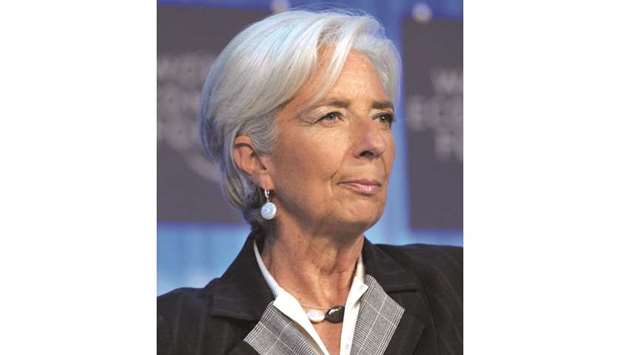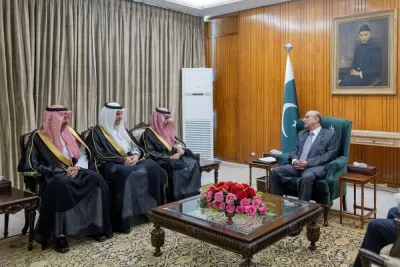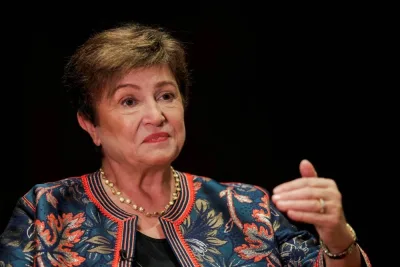International Monetary Fund (IMF) chief Christine Lagarde met Prime Minister Imran Khan yesterday and assured him that the IMF stands ready to support Pakistan.
The meeting took place on the sidelines of the World Government Summit in Dubai, hosted by the United Arab Emirates, both the IMF and the Prime Minister’s Office said.
“I reiterated that the IMF stands ready to support Pakistan,” Lagarde said in a statement following the meeting.
A team from the IMF visited Pakistan in November to discuss a possible bailout with officials, though the talks ended without agreement, but since then the government official said talks were still ongoing on a possible bailout.
Pakistan – which has gone to the IMF repeatedly since the late 1980s – is facing a balance of payments crisis.
“I also highlighted that decisive policies and a strong package of economic reforms would enable Pakistan to restore the resilience of its economy and lay the foundations for stronger and more inclusive growth,” said Lagarde, calling the meeting “good and constructive”.
Pakistan last received an IMF bailout in 2013 to the tune of $6.6bn.
Forecasts by the IMF and the World Bank suggest the Pakistani economy is likely to grow between 4.0% and 4.5% for the fiscal year ending June 2019, compared to 5.8% growth in the last fiscal year.
When the original estimate was reported last April by the government of then-prime minister Shahid Khaqan Abbasi, it was hailed as the strongest growth in 13 years.
Addressing the World Government Summit, Prime Minister Khan said that his government has started a reform programme and is trying to improve its economic policies.
“Reforms are painful but it is essential if we have to get out of our current problems,” he told the summit, adding that his government is taking efforts to cut down the fiscal and current account deficit.
“We are seeing optimism, investors are going to the country, we feel Pakistan is about to take off,” Khan said.
The prime minister has launched a highly-publicised austerity drive since being sworn in last year, including auctioning off government-owned luxury vehicles and buffaloes, in addition to seeking loans from “friendly countries” and making overtures to the IMF.
The UAE, Pakistan’s largest trading partner in the Middle East and a major investment source, recently offered $3bn to support Pakistan’s battered economy.
Islamabad also secured $6bn in funding from Saudi Arabia and struck a 12-month deal for a cash lifeline during Khan’s visit to the kingdom in October.
It has also received billions of dollars in Chinese loans to finance ambitious infrastructure projects.
Despite the pledges, the ministry of finance said Pakistan would still seek broader IMF support for the government’s long-term economic planning.
In January, Pakistan launched a new investment certificate for overseas citizens, aimed at easing the country’s balance of payments crisis.
Pakistan’s finance ministry said the government and IMF would work together on policy priorities and reforms aimed at reducing imbalances and sustaining jobs.
“In this regard, deliberations between Pakistani authorities and IMF staff will continue to finalise an agreement on the contours of a programme,” it said in a statement.
The IMF is calling for structural reforms to the Pakistani economy, which has struggled to build up its manufacturing sector and strengthen exports, despite a sharp fall in its currency over the past year.
It has long struggled to increase tax revenues and has seen foreign borrowing balloon on the back of a surge in capital investment as part of the massive infrastructure projects begun under the China Pakistan Economic Corridor (CPEC).
Pakistani officials have said they are worried that strict IMF conditions could constrain growth prospects.
“The problem is not the (IMF) deal, the problem is the condition attached to the deal,” Information Minister Fawad Chaudhry has said. “We don’t want conditions that hurt Pakistan’s growth prospects. We want a fair deal that can actually help Pakistan in the short term, without affecting our long-term economic goals.”
Prime Minister Khan is in Dubai on a day-long visit, on the invitation of Sheikh Mohamed bin Rashid al-Maktoum to participate in the seventh edition of the World Government Summit.
He is accompanied by Foreign Minister Shah Mehmood Qureshi, Finance Minister Asad Umar, Minister for Maritime Affairs Syed Ali Haider Zaidi, and Adviser to the PM on Commerce Abdul Razak Dawood.
This annual gathering of heads of states/government, policymakers, business leaders and experts will provide an occasion to discuss current and future opportunities to improve governance through reform, innovation and technology.

Christine Lagarde


